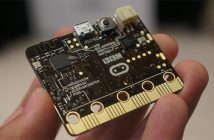
In his 2011 State of the Union address, President Obama set an ambitious goal of preparing 100,000 STEM teachers by 2021. In January this year, the President announced a $4 billion “Computer Science for All” plan that aims to provide computer science education to all American kids and especially girls from minority groups. As a response, the education group 100Kin10, a coalition of tech companies, state agencies and foundations, has come together to support and foster science, technology, engineering, and mathematics (STEM) education nationwide.
Carrie Mihalcik of CNET writes that Talia Milgrom-Elcott, the co-founder of 100Kin10, commented that, “STEM is at the bottom of some of the most pressing challenges nowadays and to solve it we need to use all the brainpower and diverse experiences our people have“.
The New York Times recently described 100Kin10 as, “the most important effort for increasing the level of STEM education for the following generation of American students,” says the official website of 100Kin10.
Girls Who Code, Harvard University, and the Smithsonian Science Education Center are among the nearly 50 companies and organizations that have already joined 100Kin10 in its efforts to promote STEM education across the country. One of the newest business partners is Battelle, a major technology center focused on the design, development and manufacturing of products for health and life sciences, sustainable energy and environmental industries. Battelle has agreed to train at least 425 STEM teachers in 80 schools in Ohio and Tennessee. The company will also expand programs such as College Ready Math and Literacy, Trailblazer Teachers, Innovative Leaders Institute, and more. Aimee Kennedy, the Vice President of Education and STEM Learning at Battelle, said that thanks to 100K10, Battelle will be able to link schools, educators and students they support to more opportunities in the future.
PledgeCents is another new partner of the 100Kin10 initiative. It is an innovative company helping teachers raise awareness about what their classrooms need and gather donations. As a part of 100Kin10, PledgeCents will now invest $2 million in critical STEM resources to over 5,000 classrooms and 125,000 students nationwide.
However, the lack of enough STEM teachers is not the only problem that both government and non-profit sector need to solve.
A new research survey conducted among 644 parents of children under 18 living in the household has shown that barely 9% of the parents would encourage their children to become STEM teachers. Harris Poll conducted the survey, which was commissioned by the American Society of Quality (ASQ), an organization that promotes “culture of quality” among different industries by focusing on tech disciplines such as Six Sigma and Lean.
The survey results also showed that while 90 percent of parents would approve it if their kids want to pursue a STEM career, 87 percent of them would be “concerned” if the emphasis was in STEM teaching. A majority of the respondents admitted they would prefer that their children become engineers. 41 percent opted for a degree in Medicine, and 27 percent would want to see a career in the IT sector.
An independent ASQ poll among K-12 teachers showed nearly the same results. 74 percent of the respondents commented they would encourage a career in engineering. 44 percent in science, and 33 percent opted for IT analyst as their kids’ future career. Only 3 in 10 respondents (29 percent) admitted they would encourage their children to become STEM teachers.
According to Dian Schaffhauser of The Journal, the biggest concern about teaching is remuneration. Seven in ten parents questioned by Harris and eight in ten teachers (77 percent) polled by ASQ said that teachers were not well-paid. 65 percent thought a STEM teaching career would not be worth the college expenses. In addition to that, two-thirds of the educators said that teaching did not offer much room for career growth.
Mihalcik also touched upon another important issue in the tech education. She cited a survey conducted by Girls Who Code showing that while 74 percent of high school girls like STEM subjects, only 0.3 percent of go on to a Computer Science major in college. Despite efforts of organizations like 100Kin10, gender imbalance persists in the tech industry. and although leading tech companies have increased diversity, progress is still slow. To date, women are filling roughly 15 percent of tech jobs.




